
With 3D dental scanning, your crown will be as natural and life-like as your smile.

A crown is your smile's ultimate comeback—repairing damage, preventing further issues, and leaving you with a brilliant, functional tooth.
400+ 5-Star Google Reviews ⭐⭐⭐⭐⭐
You’re worried about the cost of a dental crown and whether it’s truly worth your time and investment.

❌ The thought of needing a crown for a tooth can be daunting, especially if you’ve never had one before.
❌ Dental crown costs can feel like they come with hidden fees.
❌ A frequent question is how long a crown lasts and when it might need replacement.
With 3D dental scanning, your crown will be as natural and life-like as your smile.
A crown is your smile's ultimate comeback—repairing damage, preventing further issues, and leaving you with a brilliant, functional tooth.
400+ 5-Star Google Reviews
⭐⭐⭐⭐⭐



❌ You might be worried about the cost of a dental crown and whether it’s worth the investment.
❌ The procedure for getting a crown can seem time-consuming, with multiple visits.
❌ You may be concerned about potential discomfort or sensitivity during the crown placement.
❌ The thought of needing a crown for a tooth can be daunting, especially if you’ve never had one before.
❌ You may wonder how long the crown will last and if it will need to be replaced later.


Dental crowns made simple and stress-free, from start to finish.
A confident smile is worth the investment—let us guide you
through the process.

Meet Your Dentist
"Dental Crowns are a predictable way to prevent cracked teeth and deep cavities from getting into the nerve, if we can catch them early enough."
- Dr. Rouse
Dr. Alex Rouse, DDS, FADI, PLLC

"Dental Crowns are a predictable way to prevent cracked teeth and deep cavities from getting into the nerve, if we can catch them early enough."
- Dr. Rouse
Why Open Late Dentistry?

Advanced Tech. Better Smiles
"These guys are an amazing team! Always on time, thorough, professional and friendly! All the new technology too. Highly recommend"
Susan D.
⭐⭐⭐⭐⭐

An Environment You’ll Love
"I always have a great experience at Open late dentistry. The environment and the infrastructure is great and the doctor is amazing."
Gokul H.
⭐⭐⭐⭐⭐

Easy Online Booking
"Had a wonderful experience at the Dentist today. The ease of booking an appointment online and the atmosphere were enough to put me at ease. The Dr and staff were both personable which made the process a breeze. I definitely recommend their services at Open Late Dentistry"
Kristin H.
⭐⭐⭐⭐⭐
Transparent Cash Patient Pricing
Ready to find the perfect plan? Explore our transparent rates and choose what's right for you!
TESTIMONIALS.
Don't just take our word for it... When it comes to who you trust your dental care with, see what our Celina-area residents are saying about the Open Late Dentistry and Orthodontics Team
TESTIMONIALS.
Over 400+ 5-Star Google Reviews
Don't just take our word for it. When it comes to who you trust your dental care with, see what our Celina-area residents are saying about the Open Late Dentistry and Orthodontics Team
F.A.Q.'S
What is the cost of a dental crown?
The cost depends on the material and complexity of the case. We provide a detailed estimate during your crown consultation, so you’ll know exactly what to expect before moving forward.
Do you offer financing or payment plans for crowns?
Yes — we offer flexible financing options, including third-party financing provider, to make crowns more affordable and manageable within your budget.
Do you offer virtual consultations or teledentistry?
Yes — you can consult with our team virtually to discuss crown treatments, review options, and get a preliminary estimate before coming in for any in-person visit.
Why do I need a crown instead of just a filling?
A crown is recommended when a tooth has a large cavity, extensive decay, a large existing filling, or has undergone a root canal. It fully caps the tooth to restore its strength, shape, and function—offering protection that a simple filling often can’t provide.
A filling that is too large, especially mercury fillings that expand and contract with temperature changes, can cause the tooth to flex under a heavy bite. Over time, this often leads to fractures, darkened areas of the tooth, and in many cases, the loss of an entire section that may require extraction and replacement with a dental implant.
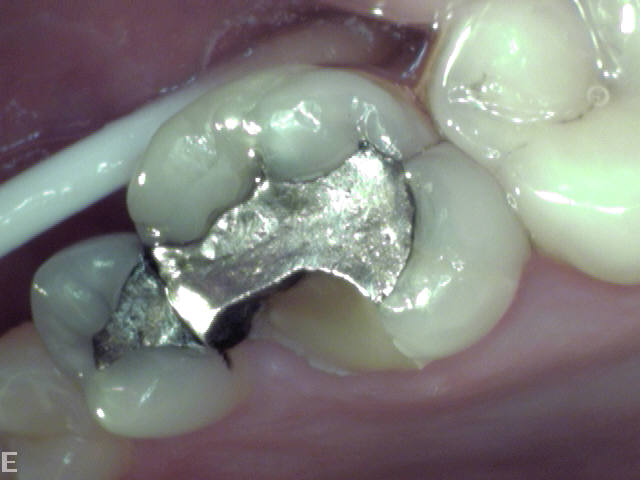
What’s the difference between a crown and a veneer?
Crowns cover the entire visible surface of a tooth to restore strength, shape, and function.
Veneers are thin shells bonded to only the front of the tooth, ideal for improving appearance but not for restoring structural integrity. Crowns are chosen for durability and full coverage, whereas veneers are selected for cosmetic enhancement.
What should I expect at my first visit?
At your first crown visit, your dentist will carefully shape the tooth to make room for the crown and ensure a proper fit. We’ll then take precise 3D scans of your tooth instead of traditional molds, which are sent to the lab to create your custom crown. Before you leave, we’ll place a comfortable temporary crown to protect your tooth until your permanent crown is ready.
What is digital 3D scanning and how does it help with crowns?
Natural-Looking All-Porcelain Dental Crowns are Custom Made To Fit Precisely For Each Patient's Exact Tooth Dimensions and are Digitally Scanned at Our Office to Be Fabricated Just For You!
3D Scanning is Used With Digital Photography to convey to You and the Dental Lab exactly what the expectation is from your new Dental Crown
LEAVING TRADITIONAL “GOOPY” DENTAL IMPRESSIONS BEHIND
Traditional Dental Impressions use materials loaded in a tray to create a mould of your tooth that is sent to the lab for fabrication. Shipping and heat can lead to distortion of this impression and patients with a gag reflex or the sensation of a fully set impression being pulled out of their mouth have enjoy the benefits of our 3D Dental Scanner!
I have dental anxiety. Do you offer sedation options during the treatment?
Absolutely. We offer nitrous oxide (“laughing gas”) as well as oral or IV sedation options to help you stay calm and comfortable throughout crown procedures. Our team will recommend the best approach based on your needs and medical history.
What does out-of-network dental insurance mean?
Out-of-network means your dentist doesn’t have a set payment deal with your insurance company. You can still go to them, but your insurance might cover less of the cost, so you’ll pay more than you would with an in-network dentist. Sometimes, depending on your plan, your insurance may not pay anything — in that case, you would pay the full amount yourself.
What is a dental crown?
A dental crown is a tooth-shaped cap placed over a damaged or weakened tooth to restore its shape, strength, and appearance.
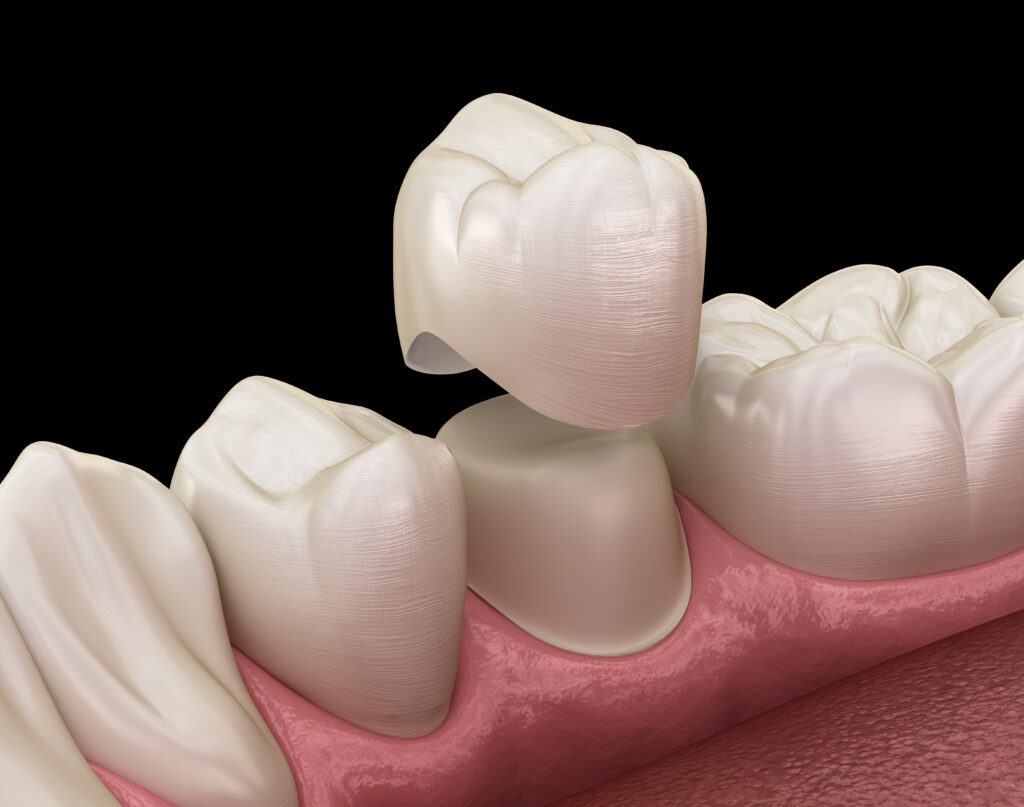
When would I need a dental crown?
Crowns are used to protect a cracked tooth, restore a tooth after a root canal, cover a large filling, or improve the appearance of a discolored or misshapen tooth.

How long does it take to get a dental crown?
Getting a crown usually takes two visits. During the first visit, we prepare your tooth and take impressions. At the second visit, the permanent crown is placed.
Will you need to remove a lot of my tooth to place a crown?
To prepare a tooth for a crown, we remove any existing fillings, decay, and weakened areas to ensure a solid foundation. On average, about 2 mm of thickness is needed around the tooth to allow the crown to fit properly and stay strong. Our goal is always to preserve as much healthy tooth structure as possible while creating enough space for a durable, long-lasting crown.
What materials are dental crowns made of?
Crowns can be made of porcelain, ceramic, metal, or a combination of materials. Porcelain or ceramic crowns are popular for their natural appearance.
Modern dentistry means we can now fabricate metal-free Dental Crowns that don’t show while you have a conversation with a friend or have a grey margin at the gum line on a front dental crown, giving the appearance of a dead or dying tooth. This is because we use the latest material which can be pressed thinner and are made from ever-increasing strength in our material selection for your custom-made Dental Crowns.
Do dental crowns look natural?
Yes, especially porcelain and ceramic crowns. We do our best to match the crown’s color, shape, and size to your natural teeth for a seamless look.
Can I still get a dental crown if I’ve had a root canal?
After a root canal, a crown is usually recommended to protect the weakened tooth structure, particularly if a large portion of the tooth is missing. It helps prevent fractures and restores function—especially when more than one-third of the tooth's surface has been removed.
What is a Desensitizer?
A desensitizer is a special medication we apply to your tooth to help reduce sensitivity, especially after a filling, crown, or deep cleaning. It works by sealing the tiny tubules in your enamel that can cause discomfort. It's quick, painless, and can make a big difference if you have sensitive teeth. Both Indirect Pulp Capping (IPC) and Desensitizer treatments are used to help protect the tooth and potentially prevent the need for a root canal.
What is IPC or Indirect Pulp Capping?
IPC, or Indirect Pulp Capping, is a procedure we do to help protect a tooth with a deep cavity. Instead of removing all the affected dentin, we place a special medication to help the tooth heal and avoid needing a root canal. If's a way to keep the tooth strong and healthy while preventing further decay. Both Indirect Pulp Capping (IPC) and Desensitizer treatments are used to help protect the tooth and potentially prevent the need for a root canal.
What is a Cracked Tooth Syndrome (CTS)?
The earlier a split tooth is diagnosed and treated, the better success there is in treating it. If the split is severe, a root canal may be necessary to save the tooth. Teeth that initially present with cold sensitivity are less likely to be fixed with the crown alone. If this does not work, the treatment plan will be modified and a root canal will be needed. If left untreated, the tooth may eventually be lost. It is also possible that the initial split of the tooth may be such that it cannot be saved, despite our best efforts.

What is Attrition?
Grinding or Clenching causing wear on the edges and V-Shaped Notches at the gum line.
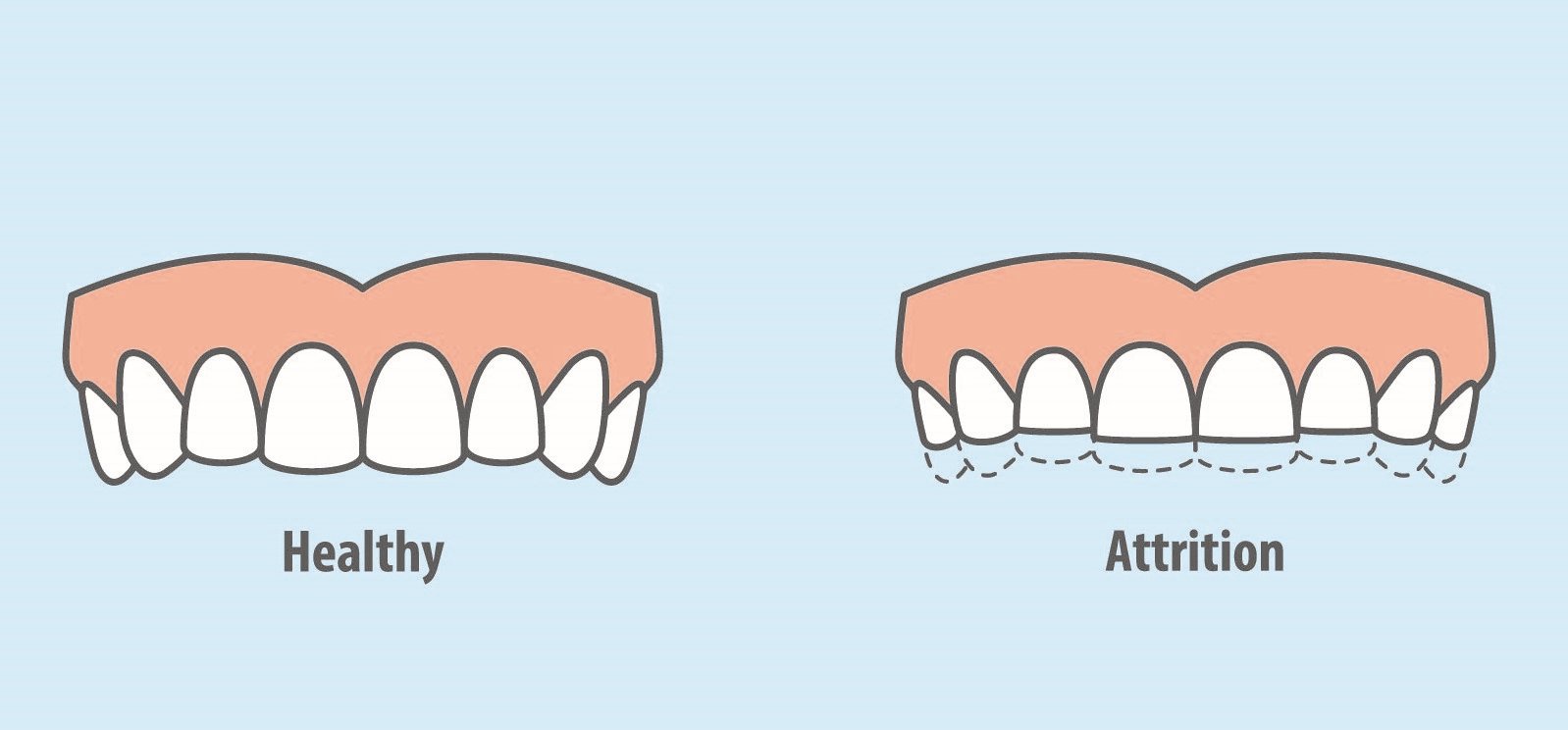
What is bite equilibration?
Bite equilibration is a dental procedure that adjusts how your teeth come together to ensure a balanced, even bite. Please see this youtube video for more info on bite equilibration: https://www.youtube.com/watch?v=-xL23JsLpyA&pp=ygUWT2NjbHVzYWwgRXF1aWxpYnJhdGlvbg%3D%3D.
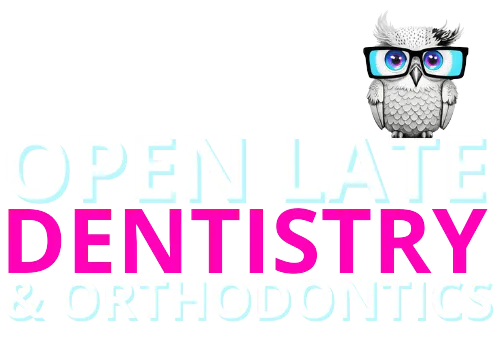
OFFICE HOURS
TUESDAY: 12:00 PM - 6:00 PM
WEDNESDAY: 12:00 PM - 6:00 PM
THURSDAY: 12:00 PM - 7:00 PM
FRIDAY: 10:00 AM - 5:00 PM
SATURDAY: 10:00 AM - 2:00 PM
(Select Saturdays Only)
OPEN LATE DENTISTRY & ORTHODONTICS
Contact Us
TEXT us at: 972-885-9670
Location
1212 S Preston Rd #130,
Celina, TX 75009, United States

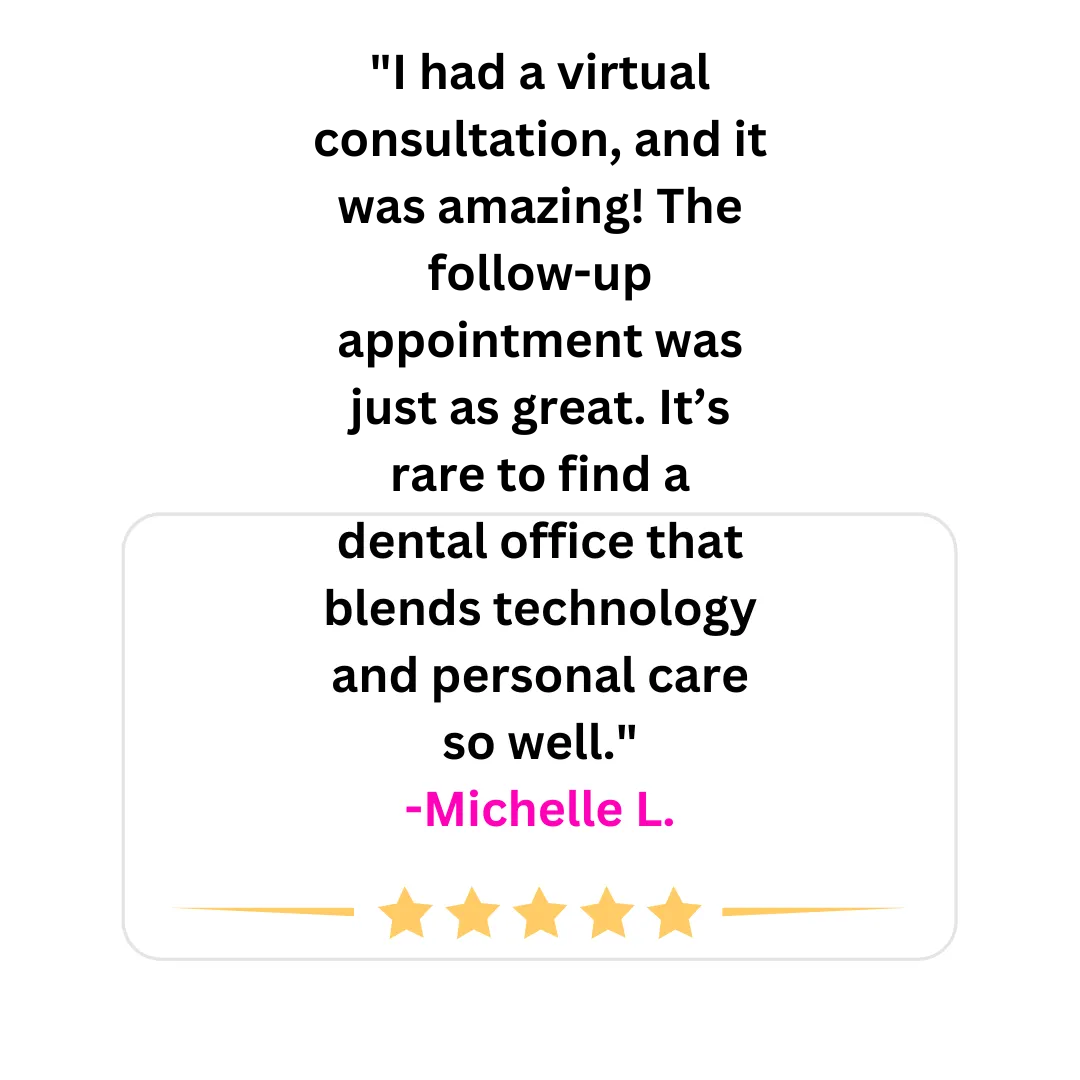














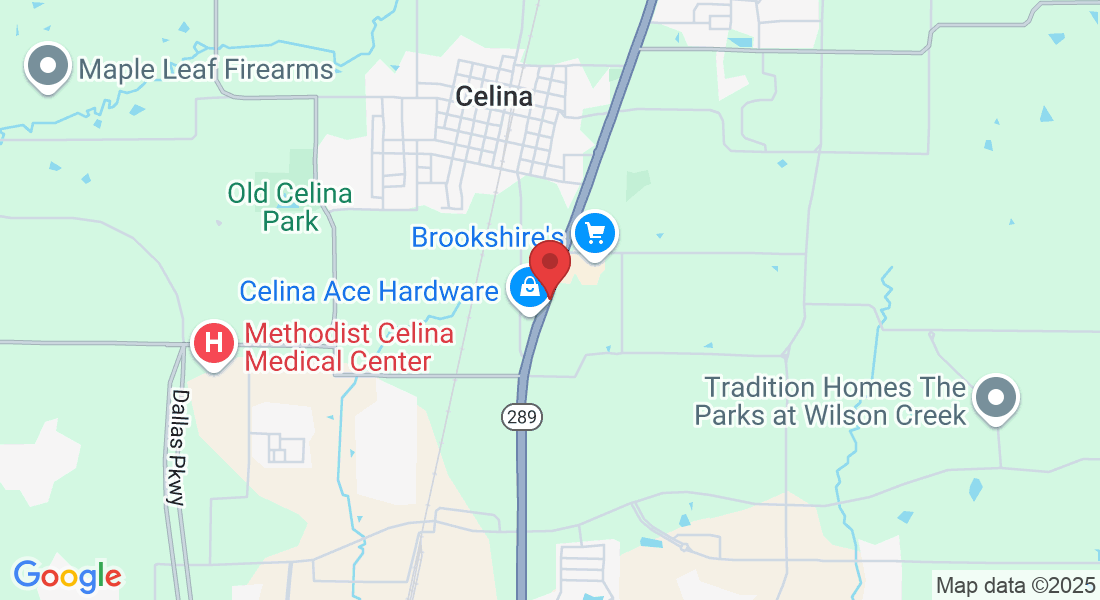
Facebook
Instagram